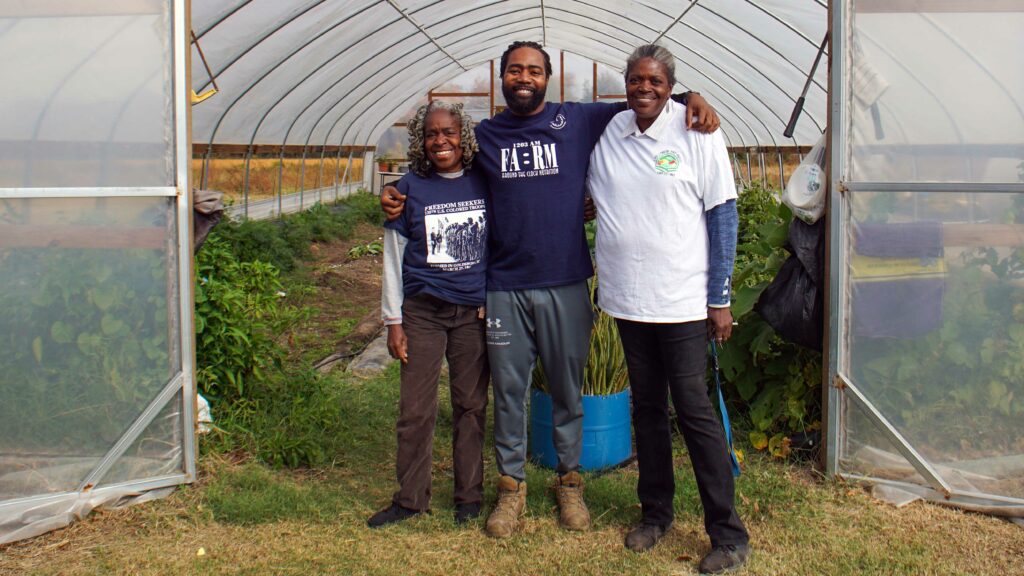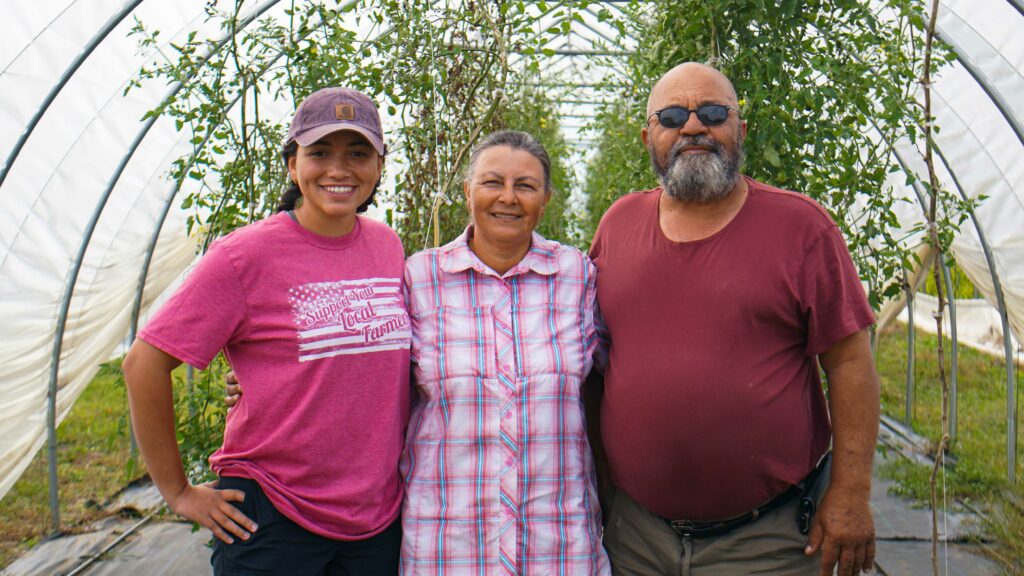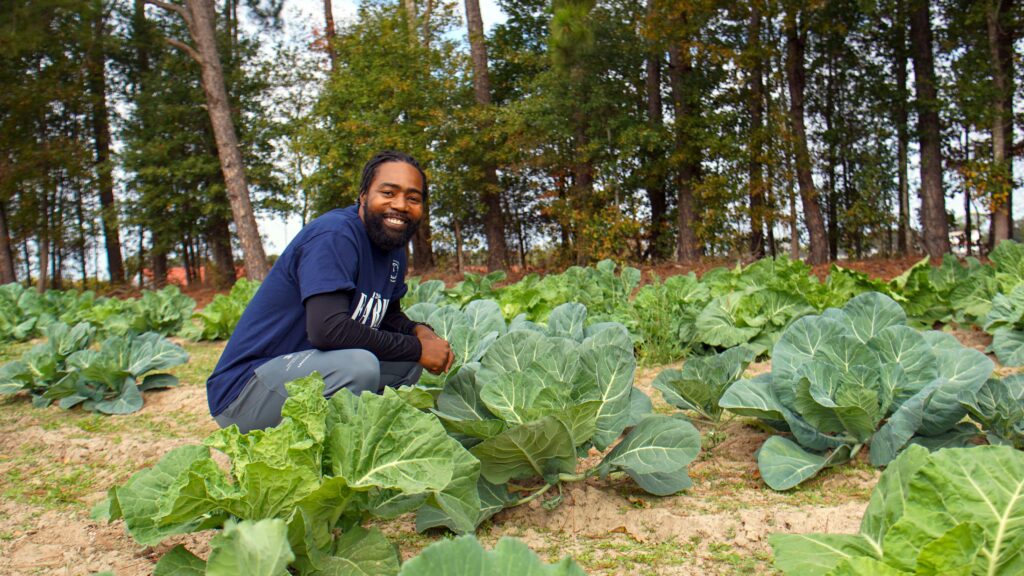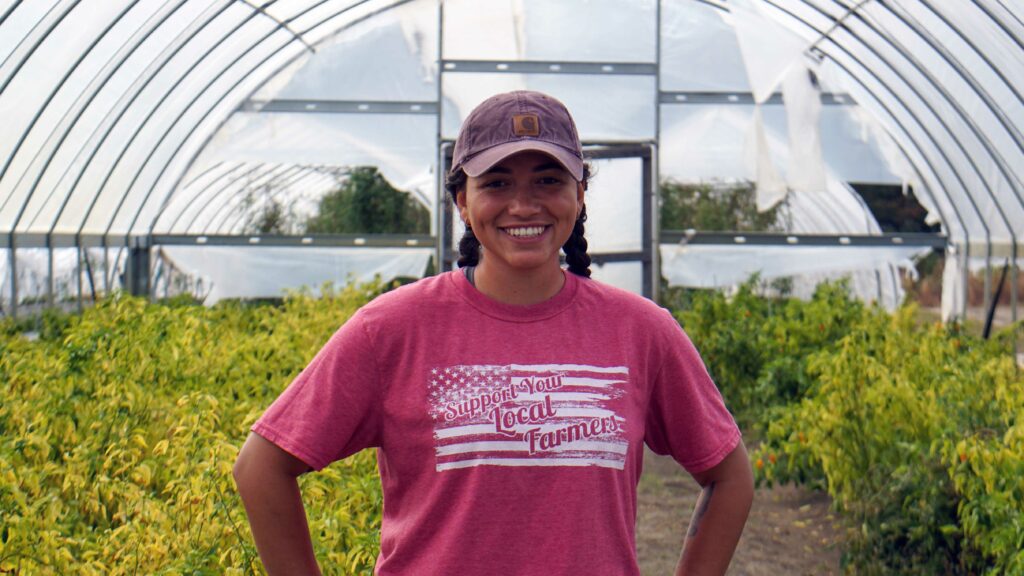NC State Apprenticeship Programs Introduce Veterans to Farming
go.ncsu.edu/readext?897805
en Español / em Português
El inglés es el idioma de control de esta página. En la medida en que haya algún conflicto entre la traducción al inglés y la traducción, el inglés prevalece.
Al hacer clic en el enlace de traducción se activa un servicio de traducción gratuito para convertir la página al español. Al igual que con cualquier traducción por Internet, la conversión no es sensible al contexto y puede que no traduzca el texto en su significado original. NC State Extension no garantiza la exactitud del texto traducido. Por favor, tenga en cuenta que algunas aplicaciones y/o servicios pueden no funcionar como se espera cuando se traducen.
Português
Inglês é o idioma de controle desta página. Na medida que haja algum conflito entre o texto original em Inglês e a tradução, o Inglês prevalece.
Ao clicar no link de tradução, um serviço gratuito de tradução será ativado para converter a página para o Português. Como em qualquer tradução pela internet, a conversão não é sensivel ao contexto e pode não ocorrer a tradução para o significado orginal. O serviço de Extensão da Carolina do Norte (NC State Extension) não garante a exatidão do texto traduzido. Por favor, observe que algumas funções ou serviços podem não funcionar como esperado após a tradução.
English
English is the controlling language of this page. To the extent there is any conflict between the English text and the translation, English controls.
Clicking on the translation link activates a free translation service to convert the page to Spanish. As with any Internet translation, the conversion is not context-sensitive and may not translate the text to its original meaning. NC State Extension does not guarantee the accuracy of the translated text. Please note that some applications and/or services may not function as expected when translated.
Collapse ▲It’s an unseasonably chilly morning at the roadside produce stand outside Mount Olive in rural Wayne County. Temperatures are forecast to reach the 60s later on, but right now it’s far from it. There’s a nippy wind that has visitors to J&J Martin Farm Produce regretting their lack of jackets and sweaters.
Darius McKoy doesn’t join in the grumbling about the weather. He’s only wearing a long-sleeved T-shirt himself, but nothing can take the smile off his face. He looks around at the collards, the kale, the turnips, the carrots, the peas. Under the tutelage of sisters Jeanette Martin Horn and Joyce Martin Bowden, owners of the farm, he had a hand in growing the produce. The cold wind can’t remove the warm glow of pride.
With ample assistance from the sisters and an apprenticeship program administered by NC State Extension and the Center for Environmental Farming Systems (a partnership of NC State and North Carolina A&T State universities, along with the North Carolina Department of Agriculture and Consumer Services), McKoy is well on the way to fulfilling a dream.
The 40-year-old North Carolina native was preparing for retirement from the Air Force after serving his country for more than 21 years. Many veterans leaving the military are faced with the “what’s next” question. He and his wife, Shameeka, knew the answer.
“We wanted to grow our own vegetables and fruit organically,” he said. “I’d like to spread that among the community. One of our main goals is to get a contract with the school system to provide our future leaders with healthy food. Another goal is to launch a mobile vegan and juice bar.”
But how to make the dream a reality? Growing vegetables and fruit is a challenge when you’re new to farming.
McKoy enlisted in the Air Force after graduating from Hoggard High School in Wilmington. He served as a military policeman and drill instructor, among other duties. Important work, but nothing that prepared him for a second career in agriculture.
An Air Force skills bridge program led McKoy to an agriculture internship through NC State. That in turn led him to Boots on the Ground, a 12-month registered apprenticeship program administered through CEFS.
The program pairs veterans interested in a career in agriculture with farmers willing to pass on their knowledge to an apprentice.
“There’s not really any long-term training programs in North Carolina for veterans who want to go into farming,” said Angel Cruz, CEFS Academic and Extension Initiatives Manager with NC State. “There are a lot of online programs, and three to six-week programs, but really to get the kind of grounding and experience you need to start your own operation, you need in-depth, hands-on experience. That’s the goal of the program.”
North Carolina bills itself as the nation’s most military-friendly state. With major military bases including Camp Lejeune, Fort Bragg and Seymour Johnson Air Force Base, North Carolina has the third-largest military presence and is seventh in number of veterans.
Boots on the Ground is the state’s first registered agricultural apprenticeship program for military veterans. It aims to increase the pool of trained agricultural workers for management and entrepreneurial positions in North Carolina. There are six veterans currently placed on farms in the pilot year. The goal is to place 10 veterans next year.
“The top two industries in the state are agriculture and defense,” said Sara Kidd, the apprenticeship coordinator for Boots on the Ground as well as an 18-month Sustainable Vegetable Production program that also includes veterans. “It’s the perfect match for North Carolina.”
A registered apprenticeship allows veterans to use their GI Bill education benefits for on-the-job training.
“Any veteran can apply if they have an honorable discharge. That’s a requirement for the GI Bill,” Kidd said. “We can work with veterans who are in vocational rehabilitation, and they get some additional support and benefits.”
Apprentices adhere to a state-approved curriculum.
“They have to do 2,000 hours of on-the-job training, which is working on the farm, and 144 hours of related instruction,” Cruz said. “That is usually formal instruction, classroom training, but it can be a farm tour or a hands-on workshop like irrigation.”
NC State Extension agents are often involved in the related instruction phase, introducing apprentices to farmers, conducting workshops, and providing supplemental eduction.
The program sprang from conversations between Cruz and Kidd, who was an NC State graduate student doing a masters project on apprenticeships.
“I found out about Sara’s research and we started talking,” Cruz said. “I was interested in starting a registered apprenticeship program. We worked on this grant together once Sara graduated, combining both of our passions, and now here we are, turning it into a reality.”
Kidd, who is now pursuing a doctorate in agriculture and Extension education, was thrilled to see the initiative evolve from “wouldn’t this be great” to reality when veterans were placed on farms with mentors this summer.
“It means a lot professionally and personally,” she said. “It’s hard to get into agriculture if you’re not from a farming family. I was so fortunate to get involved with CEFS and they have really supported my love for working with veterans and agriculture. It’s gone hand-in-hand really well.”
Her vision for the program came from personal experience. Her husband, Joe, is a Marine Corps veteran. The couple wanted to start a sheep farm in Nash County, but faced a steep learning curve.
“We looked into all the training programs in North Carolina for veterans. There were several awesome short-term programs, but nothing that provided long-term training and a lot of hands-on, work-based learning,” she said. “When I started my graduate work I knew I wanted to do my final project on something related to veterans and agriculture education. Utilizing a registered apprenticeship program is one of the few ways that veterans are able to use their GI Bill for hands-on job training.”
Related: From combat boots to cowboy boots
Agriculture tends to be generational. You learn farming from your parents, who learned from their parents, who learned from their parents. The apprenticeship program is a way not just for veterans from non-agricultural backgrounds to become farmers, but to allow vital generational knowledge to be passed on from farmers without family members to follow in their footsteps.
“We’re older, in our 60s. To transfer knowledge to somebody in their 20s and 30s is the way of the future,” said Millard Locklear, who operates New Ground Farm in Robeson County with his wife, Connie. “Knowledge is the only thing you can’t lose. You can lose your land, your house, your health and everything else. But knowledge stays with you until the end of your life. So if you can pass that knowledge to another person that’s an asset, really.”
The Locklears are passing on their knowledge to Marlena Chieffo, who wanted to learn about agriculture after serving as an Army medic at Fort Bragg for 4.5 years.
“They are awesome,” Chieffo said. “Before I got here I was really nervous. My mom said you’re just going to go meet family you haven’t met before. That’s exactly how it felt. They were like family I had never met before. They took me in, and they are teaching me what they know.”
McKoy feels the same way about Jeanette and Joyce, the sisters who operate J&J Martin Produce in Mount Olive.
“They have been very, very patient with someone who is very raw in this career field. They have been very understanding and helpful, loving, you name it,” McKoy said. “They are really good people. I couldn’t ask for a better group of people to be around. They care.”

Sisters Jeanette Martin Horn and Joyce Martin Bowden are passing along their farming knowledge to apprentice Darius McKoy.
In his first few months on the farm, he has learned how to plant, how to care for crops in the field, how to harvest, and how to prepare produce for market.
“The apprenticeship programs have core competencies, the concepts you have to learn to complete the course,” McKoy said. “Miss Joyce and Miss Jeanette sit down with me, go over the plan, and say we’re going to hit this check point, that check point. Upon completion of that particular week, we’ll sit down and they’ll say do you have any questions on what you’ve done. If there’s something, they’ll stop me right there so we can go through it and make sure I understand.”
McKoy isn’t shy about asking questions, which impressed the sisters from the beginning.
“He’s very observant,” Jeanette said. “He pays attention to everything, every detail. He has an interest in organic farming. You’ve got to learn the insects and the soil. If you don’t learn those things, it’s going to be almost impossible to do organic. He has a keen interest in that. I’ve had some people out here, you say move that piece of wood from here to over there, and that’s all they do. They don’t question why. If I say move something and they ask me the question and figure it out, I know they are interested. He shows he is interested.”
When Jeanette and Joyce learned of the opportunity to take on an apprentice, they didn’t hesitate.
“We aren’t getting any younger,” Joyce said. “We want younger farmers to know how to do this. It’s a good thing for the community to have locally grown produce as an option. The only way for that to happen is for those of us who know how to do it to teach the next generation.”
It’s also nice to have a willing worker and a fast learner to help out around the farm.
“Having Darius as the apprentice, we have been able to spend more time planning instead of doing all of the labor,” Joyce said. “He’s helped with harvesting okra and peas. We had a wholesale buyer, and were able to make sure we followed up on documentation and not have to worry about getting everything out of the field before it dried up. That’s helped a lot.”
Jeanette and Joyce’s interest in helping a veteran has historical roots.
“This farm was started by a person that came out of slavery and was in the Union army [in the 135th United States Colored Troops],” Jeanette said. “This farm has been here since 1883. My great granddaddy Harry Martin was a slave and a veteran, and then my father was a veteran. I have two cousins who are also veterans and their cemetery is on this farm as well.”

Marlena Chieffo, who served as an Army medic at Fort Bragg, is learning now to farm from Connie and Millard Locklear.
A historical connection to the military also played a role in the Locklears’ desire to take on a veteran as an apprentice.
“My grandfather bought a farm after serving in the Second World War,” Connie said. “I still have his ledgers from an agricultural apprenticeship that he did in 1949, ‘50 and ‘51. It covered all aspects of farming, from raising cows and hogs to tilling the land. Back then he had a mule. That’s how he plowed, with a mule. From 28, 29 years old until 69 that’s what he did. He tilled the soil and farmed.”
Millard and Connie farm 11 acres, growing specialty crops including many heirloom species, as well as culinary and medicinal herbs. It is a perfect fit for Chieffo, who wants to combine her medical background with her interest in agriculture.
“I’m hoping to get my masters in counseling and bring the two together,” she said. “I’m hoping to do horticulture therapy, farm therapy.”
She has reached out to George Place, Extension assistant in therapeutic horticulture at NC State, as part of the additional educational opportunities available through the apprenticeship.
“I called him the other day and bombarded him with questions,” she said.
But that’s only part of the equation.
“I have to learn how to farm first,” she said.
Under the tutelage of the Locklears, she is doing just that. She now knows about soil amendments, getting seeds in the ground or planting them in trays, harvesting and safe handling.
“I’m learning something new every day,” she said. “Mr. Millard and Miss Connie, they teach you as you go along. That’s the best way, hands-on learning. It’s better than reading a book and trying to learn it all. I love it. I love being outside, getting to really reap what you sow, getting to see the benefits of all your hard work.”
The pairing of veteran farmers willing to pass along their knowledge with a military veteran willing to learn is a perfect match. A bonus benefit is the mentors and the apprentice are all members of the Lumbee tribe.
“We wanted to contribute to the tribe,” Millard said. “Marlena is the first Lumbee person we’ve had. If I’m going to spend a year developing somebody, I’d like to make sure [their knowledge] stays around here.”
Chieffo is rapidly gaining knowledge about farming, and is likely a couple of years away from a career in therapeutic horticulture. She moved into the longer Sustainable Vegetable Production Apprenticeship and plans to enroll in a masters program in January.
McKoy is closer to realizing his dream. He also transitioned to the Sustainable Vegetable Production Apprenticeship because it is a better fit for his career goals and has another 12 months to go. But he and Shameeka, who is also preparing to retire after 20 years in the Air Force, have purchased 38 acres in Sampson County. They are not quite ready to begin working 12:03 a.m. Farm (named after their son’s birthday and daughter’s initials), but they can see the day coming.
“We are in the process of getting the soil samples, getting it to Extension,” he said. “We’re getting there.”
It likely would not have been possible without the teaching and support from Jeanette and Joyce and the apprenticeship program.
“It’s a really good program,” he said. “You get out what you put in. To me, that’s important for anything you go into. As long as you put your best foot forward to get the information, they give you the opportunity. It’s out there for you to take it.”
The benefits also flow to the farmers, who want to see the veterans succeed.
“They’ve served their country. Now they want to serve in a different way,” Connie said. “They are caring for the soil, they are caring for the land, they are growing good food for people. They are still in service.”



